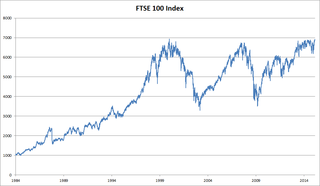
The Financial Times Stock Exchange 100 Index, also called the FTSE 100 Index, FTSE 100, FTSE, or, informally, the "Footsie", is a share index of the 100 companies listed on the London Stock Exchange with the highest market capitalisation. It is seen as a gauge of prosperity for businesses regulated by UK company law. The index is maintained by the FTSE Group, a subsidiary of the London Stock Exchange Group.

George Wimpey was a British construction firm. Formed in 1880 and based in Hammersmith, it initially operated largely as a road surfacing contractor. The business was acquired by Godfrey Mitchell in 1919, and he developed it into a construction and housebuilding firm. In July 2007, Wimpey merged with Taylor Woodrow to create Taylor Wimpey. Wimpey was first listed on the London Stock Exchange in 1934.

Barratt Developments plc is one of the largest residential property development companies in the United Kingdom operating across England, Wales and Scotland. It was founded in 1958 as Greensitt Bros., but control was later assumed by Sir Lawrie Barratt. It was originally based in Newcastle upon Tyne but is now located at David Wilson's former offices in Coalville, Leicestershire. It has been listed on the London Stock Exchange since 1968, and is a constituent of the FTSE 100 Index.
Vistry Group is a British house-building company based in Kings Hill, England. It is listed on the London Stock Exchange and is a constituent of the FTSE 250 Index.
Persimmon plc is a British housebuilding company, headquartered in York, England. The company is named after a horse which won the 1896 Derby and St. Leger for the Prince of Wales. It is listed on the London Stock Exchange and is a constituent of the FTSE 100 Index.
Westbury plc was an English housebuilding company based in Cheltenham, Gloucestershire. It was listed on the London Stock Exchange and was a constituent of the FTSE 250 Index but was acquired by Persimmon plc in 2005.

Alfred McAlpine plc was a British construction firm headquartered in Hooton, Cheshire. It was a major road builder, and constructed over 10% of Britain's motorways, including the M6 Toll. It was listed on the London Stock Exchange until it was acquired by Carillion in 2008.

Taylor Woodrow was one of the largest housebuilding and general construction companies in Britain. It was listed on the London Stock Exchange and was a constituent of the FTSE 100 Index until its merger with rival George Wimpey to create Taylor Wimpey on 3 July 2007.

The Browns Lane plant in Coventry, England was built as a Second World War shadow factory run by The Daimler Company Limited. In 1951 it was leased by Jaguar Cars and remained the company's home until 2005. It was the site of all Jaguar production until 1998, when production of the Jaguar S-Type commenced at Castle Bromwich. It was also the firm's corporate headquarters and the home of the Jaguar Daimler Heritage Trust.
Tarmac Group Limited was a British building materials company headquartered in Wolverhampton, United Kingdom. It produced road surfacing and heavy building materials including aggregates, concrete, cement and lime, as well as operating as a road construction and maintenance subcontractor.

Taylor Wimpey plc is one of the largest British based housebuilding companies. It is listed on the London Stock Exchange and is a constituent of the FTSE 100 Index. Its operational headquarters in the United Kingdom are in High Wycombe.

Taylor Woodrow Construction is a UK-based civil engineering contractor and one of four operating divisions of Vinci Construction UK. The business was launched in 2011, combining civil engineering operations from the former Taylor Woodrow group and from Vinci UK - formerly Norwest Holst.
Taylor Morrison is one of the largest home building companies in the United States. Its corporate headquarters are in Scottsdale, Arizona.

Brasfield & Gorrie, LLC, headquartered in Birmingham, Alabama, is one of the United States’s largest privately held construction firms, providing general contracting, design-build, and construction management services for a wide variety of markets. The company is skilled in construction best practices, including virtual design and construction, integrated project delivery, and lean construction, but is best known for its preconstruction and self-perform expertise and exceptional client service. Founded in 1964, Brasfield & Gorrie has 12 offices and approximately 2,600 employees. Its 2019 revenues were $3.80 billion. Engineering News-Record ranks Brasfield & Gorrie 30th among the nation’s “Top 400 Contractors” for 2017. Modern Healthcare ranks the company third among healthcare general contractors in the nation.
Countryside Properties is a UK housebuilding and urban regeneration company, operating in London and the South East of England, and with a presence in the North West of England through its Partnerships division. It is listed on the London Stock Exchange and is a constituent of the FTSE 250 Index.
McLean Homes was a major British housebuilding business.
Miller Homes is a housebuilder based in the United Kingdom. It was founded in 1934, as part of the previous Miller Group. Its corporate headquarters is in Edinburgh, Scotland. Since its inception, Miller Homes has built over 100,000 homes.
Henry Boot PLC is a British construction and property development business, listed on the London Stock Exchange. It was floated on the London Stock Exchange in 1919, becoming the first ever quoted housebuilder. Between the wars, Henry Boot built more houses than any other company.
Beazer was a family business for six generations before expanding in the 1980s into international housebuilding, construction and building materials group. After becoming overburdened with debt it was rescued by Hanson plc in 1991. A new Beazer Group, comprising solely the UK housebuilding business, was demerged from Hanson in 1994, and bought by Persimmon plc in 2001.
Ideal Homes was a British housebuilder.










